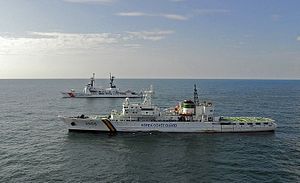On Friday, October 7, two South Korean Coast Guard speed boats were dispatched to deal with a group of around forty Chinese fishing vessels operating illegally in the Yellow Sea, around 40 nautical miles off the West Coast.
According to accounts by the Korean Coast Guard, eight officers from one of the small coastguard speed boats boarded one of the offending fishing ships, at which point a second fishing ship allegedly rammed and capsized the coastguard boat. A third fishing ship then hit the vessel in an additional collision, sinking it. The captain of the sunken Korean boat and the eight man boarding party were all subsequently rescued by the second ROK Coast Guard boat, and the offending Chinese fishing boats fled into Chinese waters.
The Korean government reacted strongly by summoning the Chinese ambassador in Seoul, Qui Guohong, the following Tuesday and by modifying the rules of engagement for the Korean Coast Guard to authorize greater use of force when dealing with encroaching fishermen. The rule changes also mean that the Korean Coast Guard will be able to track fleeing ships into international waters for apprehension.
This is not the first incidence of violence to occur between the Korean Coast Guard and Chinese fishermen operating illegally in the Yellow Sea. In 2011 a South Korean Coast Guard officer was killed and another wounded when they were stabbed by a Chinese fisherman in a similar confrontation. In 2014, a Chinese fisherman died after being shot in the chest by an officer in the Korean Coast Guard. Most recently, on September 29, 2016, three Chinese fishermen died in a fire on their vessel during an incident in which Korean Coast Guard officers used stun grenades in order to subdue them.
China and South Korea have established a boundary demarcation line. However this has done little do deter illegal Chinese fishing. The issue is somewhat complicated by the fact that South Korea and China are engaged in a broader dispute over the boundaries of their respective exclusive economic zones in the Yellow Sea, which includes rival claims to ownership of the submerged Socotra Rock, known as Ieodo in Korea and Suyan rock in China.
There has been unusually strong language coming from some on both sides regarding Friday’s incident. Senior Minjoo Party politician Woo Sang-ho referred to the Chinese fishermen as “pirates,” while a recent editorial in China’s Global Times claims that “South Korean coast guards are believed to be among the most menacing.”
Despite this rhetoric, both governments in Beijing and Seoul are unlikely to view this new incident as a serious risk to the overall health of the bilateral relationship. It does not represent a challenge to either’s core security interests in the manner of the recent decision to deploy THAAD, or Chinese diplomatic cover for North Korea. In addition, tensions between Korea and China in Korea’s western waters do not suffer from the same difficulties of the historical legacy of colonialism, which can often characterize interactions in Korea’s maritime disputes with Japan. Historically high levels of trade between the two states also suggest that neither would be likely to escalate the conflict to a level which could permanently damage their diplomatic ties.
If South Korea and China are unable to increase cooperation in regards to policing illegal fishing, then it is likely that events such as the October 7 boat sinking incident will reoccur. It is in the long-term interests of both governments to reach a solution that prevents these kinds of costly confrontations from distracting from more serious security issues, which should remain the focus of Korean-Chinese diplomacy.
Alexander Mitchell Hynd is currently studying International Peace and Security at Korea University Graduate School of International Studies.

































